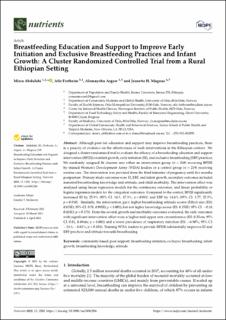| dc.description.abstract | Although peer-led education and support may improve breastfeeding practices, there is a paucity of evidence on the effectiveness of such interventions in the Ethiopian context. We designed a cluster-randomized trial to evaluate the efficacy of a breastfeeding education and support intervention (BFESI) on infant growth, early initiation (EI), and exclusive breastfeeding (EBF) practices. We randomly assigned 36 clusters into either an intervention group (n = 249) receiving BFESI by trained Women’s Development Army (WDA) leaders or a control group (n = 219) receiving routine care. The intervention was provided from the third trimester of pregnancy until five months postpartum. Primary study outcomes were EI, EBF, and infant growth; secondary outcomes included maternal breastfeeding knowledge and attitude, and child morbidity. The intervention effect was analysed using linear regression models for the continuous outcomes, and linear probability or logistic regression models for the categorical outcomes. Compared to the control, BFESI significantly increased EI by 25.9% (95% CI: 14.5, 37.3%; p = 0.001) and EBF by 14.6% (95% CI: 3.77, 25.5%; p = 0.010). Similarly, the intervention gave higher breastfeeding attitude scores (Effect size (ES): 0.85SD; 95% CI: 0.70, 0.99SD; p < 0.001), but not higher knowledge scores (ES: 0.15SD; 95% CI: −0.10, 0.41SD; p = 0.173). From the several growth and morbidity outcomes evaluated, the only outcomes with significant intervention effect were a higher mid-upper arm circumference (ES: 0.25cm; 95% CI: 0.01, 0.49cm; p = 0.041) and a lower prevalence of respiratory infection (ES: −6.90%; 95% CI: −13.3, −0.61%; p = 0.033). Training WDA leaders to provide BFESI substantially improves EI and EBF practices and attitude towards breastfeeding | |
